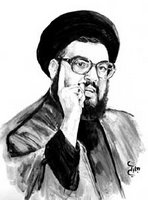
The interview dating from February last, shows Nasrallah talking with former US Diplomats on Israel, Prisoners and Hezbollah’s Founding. The link also contains a video transcript.
Beirut, Lebanon (CNN) -- Hezbollah representatives and Lebanese cabinet ministers have reached an agreement in general -- but with some major reservations -- on a proposal to end the crisis in the Middle East, high-ranking Lebanese government officials say.
U.S. Secretary of State Condoleezza Rice -- who arrived in the region Saturday -- said it initially appeared the Lebanese plan included "some very good elements."
Israel on Saturday rejected a request by the U.N. for a three-day cease-fire in Lebanon to deliver humanitarian supplies and allow civilians to leave the war zone, The Associated Press reported.Avi Pazner, a government spokesman, said Israel already had opened safe corridors across Lebanon for such shipments and that Hezbollah guerrillas were blocking them to create a humanitarian crisis.
The Lebanese cease-fire plan, reached at a meeting on Friday night, calls for an immediate cease-fire, the release of Lebanese prisoners in Israeli jails and the return of two Israeli soldiers held by Hezbollah.
The plan also calls for the return of displaced Lebanese to their homes, negotiations between Israel and Lebanon concerning the disputed Shebaa farms now under Israeli control, the disclosure of maps showing Israeli minefields near the Lebanese border, the deployment and strengthening of the Lebanese army and the expansion of the U.N. force in the south.
While Hezbollah agreed to a cease-fire with Israel and an increased international presence in southern Lebanon, the group objected to "a robust force" of international peacekeepers in the region, the sources said.
Hezbollah did not specifically agree to disarm, as Israel has demanded, the sources said. The plan does, however, call for the Lebanese military to take control of southern Lebanon, along with the U.N. force, which implies that the Hezbollah militia would not operate there.
It also calls for the implementation of the Taef accords -- which ended the Lebanese civil war in 1990 -- which includes the disarming of all militias, the sources said.Hezbollah representatives told the cabinet it had reservations about the nature of an expanded international presence in the south, the source said.Hezbollah wants only an expansion of the current UNIFIL mission with the same mandate.
They don't want a "robust force," the source said."The force must be more robust, otherwise there's no sense in it," one of the high-ranking Lebanese officials told CNN.The question of what to do about the two Israeli soldiers being held by Hezbollah was not discussed at the cabinet meeting, the sources said.
The proposal, developed by Lebanese Prime Minister Fouad Siniora, is the official position of the Lebanese government and is intended to be presented to Rice on her arrival in the region.
Source: http://www.cnn.com/2006/WORLD/meast/07/29/mideast.main/index.html
